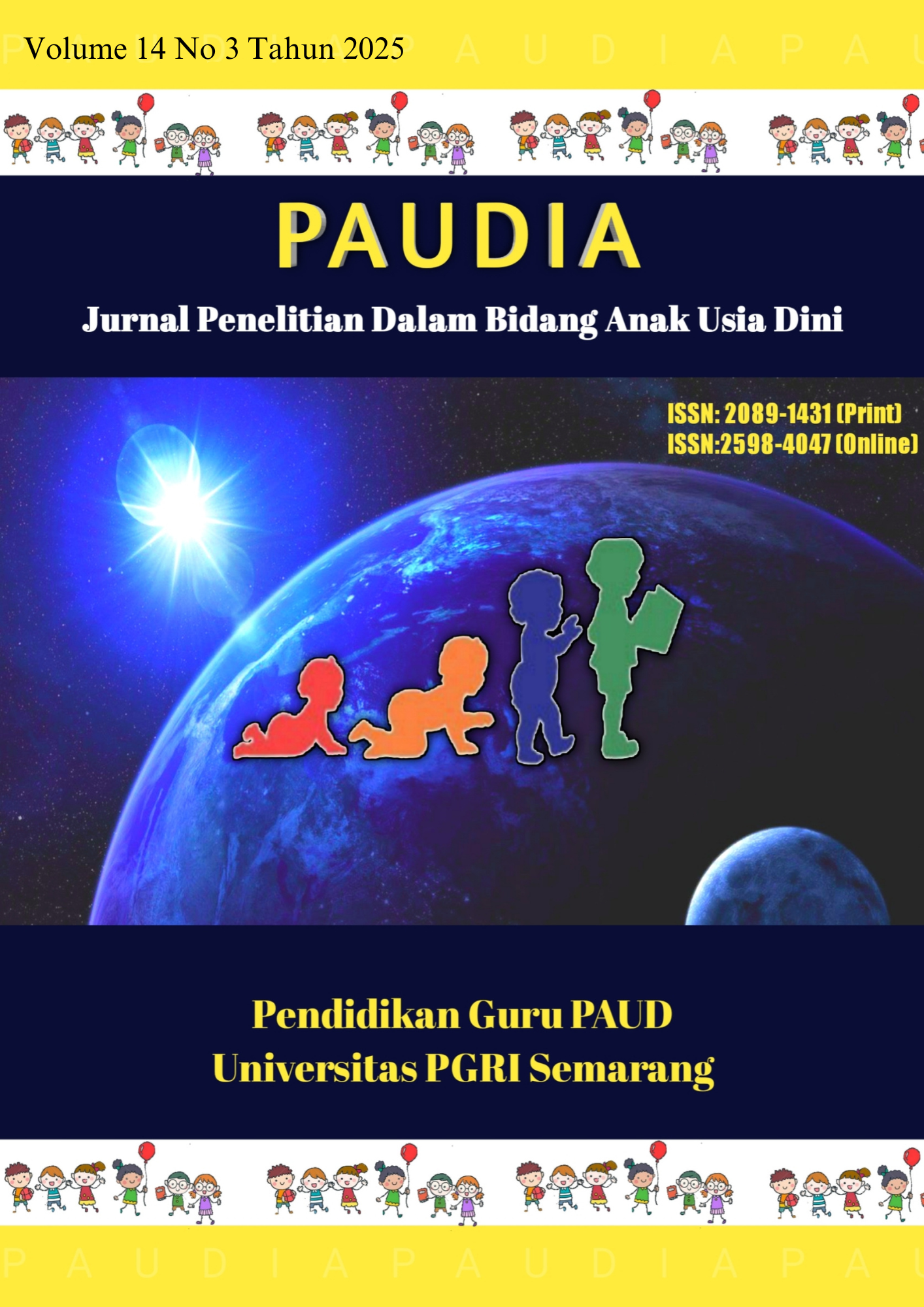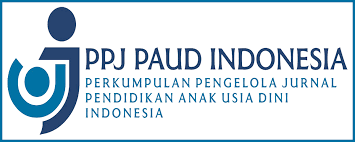The Subjectivity of Early Childhood on the Loss of a Father: A Phenomenology of Self-Confidence and Prophetic Character
DOI:
https://doi.org/10.26877/paudia.v14i3.2012Keywords:
Subjectivity, Early Childhood, Losing Father, Self-Confidence, Prophetic CharacterAbstract
Fathers are not only biological parents, but also play an important role in shaping the self-confidence and identity of young children. The absence of a father, whether physical or emotional, can cause emotional trauma and hinder a child's psychological development from an early age. This study employs a phenomenological method with an Interpretative Phenomenological Analysis (IPA) approach to explore the meaning of the experiences of five young children at TK Taruna Bakti Bandung who grew up without a complete father figure. The findings reveal that the absence of a father significantly impacts the formation of a child's psychological structure and identity, weakening prophetic values such as love, responsibility, justice, and exemplary behavior. This condition also affects spiritual autonomy, social skills, and self-understanding. Patriarchal parenting patterns that marginalize the father's role as a moral-spiritual partner exacerbate the child's developmental conditions. Based on these findings, this study recommends the development of an early childhood education curriculum that is responsive to the needs of children from fatherless families through the integration of prophetic values, the strengthening of emotional literacy, and the cultivation of social skills. Additionally, school-based psychosocial interventions such as small group mentoring, counseling, and the involvement of surrogate father figures are needed to help children build a complete, resilient identity rooted in moral-spiritual values, even without the direct presence of a father.
References
Ainawa Kholilatul Nurizah, & Muhlasin Amrullah. (2024). Pembentukan Karakter Religius Melalui Pembiasaan Islam dalam Pendidikan Dasar. Indonesian Journal of Islamc Studies, 12(4).
Akram, M., Batool, Z., Mahmood, B., & Mahmood, S. (2019a). Role of Father in Child Personality Development: Evidence from Pakistan. European Online Journal of Natural and Social Sciences. www.european-science.comhttp://www.european-science.com
Akram, M., Batool, Z., Mahmood, B., & Mahmood, S. (2019b). Role of Father in Child Personality Development: Evidence from Pakistan. European Online Journal of Natural and Social Sciences. www.european-science.comhttp://www.european-science.com
Al-Attas, S. M. N. (1995). Prolegomena to the Metaphysics of Islam: An Exposition of the Fundamental Elements of the Worldview of Islam. ISTAC.
Alyssa S Meuwissen, S. M. C. (2015). Fathers matter: The role of father parenting in preschoolers’ executive function development. J Exp Child Psychol . , 140, 1–15.
Ambarwati, R., Sri Wulan, & Elindra Yetti. (2025). Parental Involvement in Qur’anic Education for Early Childhood. PAUDIA : Jurnal Penelitian Dalam Bidang Pendidikan Anak Usia Dini, 116–128. https://doi.org/10.26877/paudia.v14i1.1203
Asimaki, A. (2014). Habitus: An Attempt at a Thorough Analysis of a Controversial Concept in Pierre Bourdieu’s Theory of Practice. Social Sciences, 3(4), 121. https://doi.org/10.11648/j.ss.20140304.13
Bornstein, M. H., Putnick, D. L., Lansford, J. E., Al-Hassan, S. M., Bacchini, D., Bombi, A. S., Chang, L., Deater-Deckard, K., Di Giunta, L., Dodge, K. A., Malone, P. S., Oburu, P., Pastorelli, C. , Skinner, A. T., Sorbring, E., Steinberg, L., Tapanya, S. , Tirado, L. M., Zelli, A., & Alampay, L. P. (2017). ‘Mixed blessings’: parental religiousness, parenting, and child adjustment in global perspective. Https://Acamh.Onlinelibrary.Wiley.Com/Doi/10.1111/Jcpp.12705, 58(8), 880–892.
Bosmans, G., Bakermans-Kranenburg, M. J., Vervliet, B., Verhees, M. W. F. T., & van IJzendoorn, M. H. (2020). A learning theory of attachment: Unraveling the black box of attachment development. In Neuroscience and Biobehavioral Reviews (Vol. 113, pp. 287–298). Elsevier Ltd. https://doi.org/10.1016/j.neubiorev.2020.03.014
Bowlby, J. (1969). Attachment and Loss (Vol. 1). Basic Books.
Brenner, P. S. , Serpe, R. T. , & Stryker, S. (2017). Role-specific Self-efficacy as Precedent and Product of the Identity Model. Sage Journal, 61(1).
Charlotte Pylyser, J. D. M. T. L. A. B. (2019). Father Reflections on Doing Family in Stepfamilies. Familiy Relation, 68(4), 500–511.
Chien, W. T., & Lau, C. T. (2023). Traumatised Children’s Perspectives on Their Lived Experience: A Review. In Behavioral Sciences (Vol. 13, Issue 2). MDPI. https://doi.org/10.3390/bs13020170
Cholimah, N., Tjiptasari, F., Asih, S., & Hanum, A. L. (2024). A Comparative Study of Moral Values Education in Public and Religion-Based Kindergartens in Yogyakarta. Golden Age: Jurnal Ilmiah Tumbuh Kembang Anak Usia Dini, 9(4), 575–587. https://doi.org/10.14421/jga.2024.94-01
Culpin, I., Heuvelman, H., Rai, D., Pearson, R. M., Joinson, C., Heron, J., Evans, J., & Kwong, A. S. F. (2022). Father absence and trajectories of offspring mental health across adolescence and young adulthood: Findings from a UK-birth cohort. Journal of Affective Disorders, 314, 150–159. https://doi.org/10.1016/j.jad.2022.07.016
Darryl Wardle. (2016). A contemporary sense of existentialism. South African Journal of Philosophy , 35(3), 336--344.
Dmitriev, A. A. ; V. N. Yu. (2022). Social and Psychological Aspects of Emotional Response in Childhood. Journal of Siberian Federal University. Humanities & Social Sciences, 15(4), 537–545.
Dwimulya Tahir, R., Maria Fatimah, J., & Simbolik, I. (2024). Interaksi Simbolik dalam Perbedaan Konsep Diri pada Anak yang Tidak Memiliki Figur Ayah (Fatherless) Kata kunci (Vol. 7, Issue 5). http://Jiip.stkipyapisdompu.ac.id
Edna G. Rich, A. W. C. J. E. (2024). The influence of religion or religious beliefs on parenting practices: a systematic review. Vulnerable Children and Youth Studies , 19(2), 356–371.
Fajarrini, A., Nasrul Umam, A., & Sunan Kalijaga Yogyakarta, U. (2023). Dampak Fatherless Terhadap Karakter Anak Dalam Pandangan Islam. P-ISSN, 3(1), 20–28. https://doi.org/10.32665/abata.v2i1.1425
Fajriyanti, A. P., Haris Fatgehipon, A., & Istiqomah, N. (2024). Kepercayaan Diri Peserta Didik Fatherless dalam Bersosialisasi di SMP Negeri 28 Jakarta. 5.
Groh, A. M. , F. R. M. P. , V. Ij. M. H. , B. M. J. , & R. G. I. (2016). Attachment in the Early Life Course: Meta-Analytic Evidence for Its Role in Socioemotional Development. Child Development Perspective, 11(1), 70–76.
Guay, R. (2024). The will to nothingness: An essay on Nietzsche’s On the genealogy of morality. . The Journal of Nietzsche Studies., 55(1), 104–110.
Harper, L., & Shaw, M. (2024). Parental Experiences of Men Raised Without Fathers or Father Figures: A Phenomenological Study. American Journal of Qualitative Research, 8(2), 63–84. https://doi.org/10.29333/ajqr/14393
Hasanudin, M., Mu’awanah, E., Nafis, M. M., & Setyowati, E. (2021). Learning Profetic Values Based On Contextual Teaching And Learning Approach In Forming Religious Characters Of Students (Multi Site Study at MI Plus Sabilul Muhtadin and MI Hidayatul Mubtadi’in Wates Sumbergempol). JMIE (Journal of Madrasah Ibtidaiyah Education), 5(2), 225. https://doi.org/10.32934/jmie.v5i2.313
Hidayah, N., Ramli, A., & Tassia, F. (n.d.). Fatherless Effects On Individual Development; An Analysis Of Psychological Point Of View And Islamic Perspective.
Hulkin, M., & Zakaria, A. R. (n.d.). Educative: Jurnal Ilmiah Pendidikan Building Student Character and Ethics in Elementary Schools with Prophetic Values through Islamic Teachings. https://doi.org/10.37895/educative.v2i2.482
Husserl, E. (1970). Husserl’s Crisis of the European Sciences and Transcendental Phenomenology. An Introduction (David Carr, Ed.; Vol. 1). Northwestern University Press.
Inge Bretherton. (1990). Communication patterns, internal working models, and the intergenerational transmission of attachment relationships. Infant Mental Healt Journal Infancy and Early Childhood, 11(3), 237–252.
Jeong, J., Bartoli, B., & McCann, J. K. (2024). Development and validation of a measure for father involvement during early childhood in a resource-limited context. BMC Public Health, 24(1). https://doi.org/10.1186/s12889-024-20344-9
Juliet K McCann, S. F. C. V. R. de O. M. O. J. J. (2024). Father involvement is a protective factor for maternal mental health in Western Kenya. National Library of Medicine .
Khayati, ma, Rohmah, S., Jurnal Pendidikan Anak Usia Dini, atthufulah, & Mighfar, S. (2024). Fenomena Fatherless Pada Anak Usia Dini Di Tk Negeri Pembina Moro Kepulauan Riau. 5(1).
Kuswanto, C. W., Meriyati, M., Pratiwi, D. D., & Sakinah, D. (2024). Study Of Social-Emotional Development: The Impact Of Fatherlessness. ThufuLA: Jurnal Inovasi Pendidikan Guru Raudhatul Athfal, 12(1), 51. https://doi.org/10.21043/thufula.v12i1.25669
M Stevenson, K. C. (2013). Intrusive fathering, children’s self-regulation and social skills: a mediation analysis. J Intellect Disabil Res . , 57(6), 500–512.
Merleau-Ponty, M. (n.d.). Phenomenology of Perception (C. Smith, Ed.; 1st ed.). Routledge & Kegan Paul.
Mocanu, V. (2023). Exploring the father figure from a psycho-dramatic perspective. Studia Universitatis Moldaviae. Seria Științe Ale Educației, 5(165), 272–276. https://doi.org/10.59295/sum5(165)2023_43
Muhibbin. (n.d.). Peran Orang Tua Dalam Menghadapi Arus Pergeseran Nilai-Nilai Humanis Pada Kehidupan Masyarakat Modern.
Nasution, H. (2010). Islam Ditinjau dari Berbagai Aspeknya (1st ed.). UI Press.
Natasha j Cabrera. (2019). Father involvement, father-child relationship, and attachment in the early years. Attachment & Human Development , 22(1), 134–138.
Novia, B. O. N., & Rachmawati, Y. (2025). Analysis of Parenting in Shaping Character in Early Childhood. PAUDIA : Jurnal Penelitian Dalam Bidang Pendidikan Anak Usia Dini, 1–12. https://doi.org/10.26877/paudia.v14i1.1102
Nurjanah, N. E., Jalal, F., & Supena, A. (2023). Studi Kasus Fatherless: Peran Ayah Dalam Pengasuhan Anak Usia Dini. Kumara Cendekia, 11(3), 261. https://doi.org/10.20961/kc.v11i3.77789
Pamuji, S., & Mulyadi, Y. (2024). Formation Of Students’ Character Through Islamic Education. International Journal of Islamic Thought and Humanities, 3(1), 26–35. https://doi.org/10.54298/ijith.v3i1.183
Peter J Taylor. (2014). eLS Philosophy of Ecology. Encyclopedia of Life Sciences.
Pujianti, Y., Rosa, A. T. R., Nuryati, E., & Aminah, S. (2025). How Do Early Childhood Children Understand Religious Values Education? PAUDIA : Jurnal Penelitian Dalam Bidang Pendidikan Anak Usia Dini, 359–375. https://doi.org/10.26877/paudia.v14i2.1603
Ramadhan, A. R., Mujahidah, U., Said, R., Sauri, S., & Faiqul Afkar, M. (2024). AL-QALAM : Jurnal Kajian Islam Dan Pendidikan. https://doi.org/10.47435/al-qalam.v16i1.3244
Ricoeur, P. (1984). Time and Narrative (K. McLaughlin & D. Pellauer, Ed.; 1st ed., Vol. 1). University of Chicago Press.
Samuel L. Perry. (2021). Religious Parenting: Transmitting Faith and Values in Contemporary America. Sage Journal , 50(2).
Sari, R., & Rozana, S. (n.d.). Pentingnya Pengembangan Literasi Moral Dalam Pendidikan Anak Usia Dini: Suatu Pendekatan Integratif Antara Nilai Agama Dan Moralitas. http://jurnal.unipasby.ac.id/index.php/incrementapedia
Scheler, M. (1973). Formalism in Ethics and Non-Formal Ethics of Values: A New Attempt Toward the Foundation of an Ethical Personalism (M. S. Frings & R. L. Funk, Ed.). Northwestern University Press.
Silpiani, M., & Wahyudin, E. (n.d.). Adversity Quotient: Fenomena Fatherless Involvement dan Kecerdasan Sosial Emosional Anak Usia Dini.
Stefanie Mollborn. (2016). Young Children’s Developmental Ecologies and Kindergarten Readiness. Demography, 53(6), 1853-1882.
Tretjakova, I., & Mihailova, S. (2016). Childhood emotional experience within the family relation to the current partnership and the desire to have children. SHS Web of Conferences, 30, 00003. https://doi.org/10.1051/shsconf/20163000003
Van Manen, M. (2014). Phenomenology of Practice: Meaning-Giving Methods in Phenomenological Research and Writing. Left Coast Press.
Viorica. (2023, June 23). Exploring The Father Figure From A Psychodramatic Perspective. Educational Sciences.
Wachid Mahroso Doloh, A. B. (2018). Pendidikan Karakter dalam Perspektif Profetik pada Puisi-Puisi. In Mahroso Doloh (Vol. 2, Issue 2).
Wahab, A., Alfarisi, U., Sasandra, N., Fajriyanthi, N. A., & Jakarta, U. M. (n.d.). Fatherless Practice And Its Relation To Child Care In Islamic Fiqh And Marriage Law In Indonesia. https://yatimmandiri.org/blog/parenting/kewajiban-orang-tua-terhadap-anak/
Yochai Ataria. (2014). Acute Peritraumatic Dissociation: In Favor of a Phenomenological Inquiry. Https://Www.Tandfonline.Com/Doi/Abs/10.1080/15299732.2013.853722, 15(3), 332–347.
Zammitti, A. , G. M. , S. S. , & M. P. (2025). Who are the models of self-efficacy? Research with students of different ages. Journal of Psychologists and Counsellors in Schools. , 35(2).
Zhong, Y. (2023). The Unique Role of Father Involvement in Child Socioemotional Development. In Journal of Education, Humanities and Social Sciences EPHHR (Vol. 2022).
Downloads
Published
Issue
Section
License
Copyright (c) 2025 Arif Hidayat, Ristiana Selina, Kuswanto

This work is licensed under a Creative Commons Attribution-NonCommercial-ShareAlike 4.0 International License.







